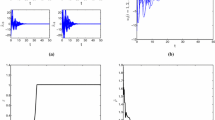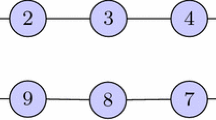Abstract
This paper explores the dynamic saturation reconstruction approach to deal with the robust coordinated tracking of saturated multi-agent systems. The first-order differential equation of the dynamic saturation function is constructed and given in quadratic form with the unrestricted control input affected by bounded input disturbance. It is shown that the dynamic saturation reconstruction function and the adaptive control input that restrict and influence each other can achieve consensus tracking, and resolve the contradiction between high performance and saturation limits. Finally, simulation results show that the actual engineering situation can be perfect by adjusting the coefficients of dynamic saturation function.
Access this chapter
Tax calculation will be finalised at checkout
Purchases are for personal use only
Similar content being viewed by others
References
Cao, Y., Yu, W., Ren, W.: An overview of recent progress in the study of distributed multi-agent coordination. IEEE Trans. Industr. Inf. 9(1), 427–438 (2013)
Xu, X.L., Chen, S.Y., Huang, W., Gao, L.X.: Leader-following consensus of discrete-time multi-agent systems with observer-based protocols. IEEE Trans. Autom. Control 118(11), 334–341 (2013)
Cai, H., Huang, J., Institute, S.: Leader-following adaptive consensus of multiple uncertain rigid spacecraft systems. IEEE Sci. China (Inf. Sci.) 59, 1–13 (2016)
Zou, A.M., Kumar, K.D.: Distributed attitude coordination control for spacecraft formation flying. IEEE Trans. Aerosp. Electron. Syst. 48(2), 1329–1346 (2012)
Liu, T., Lu, X., Jiang, Z.P.: A junction-by-junction feedback-based strategy with convergence analysis for dynamic traffic assignment. Sci. China Inf. Sci. 59, 1–17 (2016)
Ren, W., Chao, H., Bourgeous, W.: Experimental validation of consensus algorithms for multivehicle cooperative control. IEEE Trans. Control Syst. Technol. 16(4), 745–752 (2008)
Stein, G.: Respect the unstable. IEEE Control Syst. Mag. 23(4), 12–25 (2003)
Li, Z., Duan, Z., Lewis, F.: Distributed Robust Consensus Control of Multi-agent Systems with Heterogeneous Matching Uncertainties. Pergamon Press, Inc., Oxford (2013)
Chen, G., Lewis, F.L.: Robust consensus of multiple inertial agents with coupling delays and variable topologies. Int. J. Robust Nonlinear Control 21(6), 666–685 (2011)
Su, H., Chen, M., Chen, G.: Robust semi-global coordinated tracking of linear multi-agent systems with input saturation. Int. J. Robust Nonlinear Control 25(14), 2375–2390 (2015)
Wang, X., Su, H., Wang, X.: Robust semi-global coordinated tracking of saturated networked systems. IFAC-Papers OnLine 50(1), 8303–8308 (2017)
Shi, L., Zhao, Z., Lin, Z.: Robust semi-global leader-following practical consensus of a group of linear systems with imperfect actuators. Sci. China Inf. Sci. 60(7), 1–12 (2017)
Shi, L., Zhao, Z., Lin, Z.: Robust semi-global leaderless consensus and containment control of identical linear systems with imperfect actuators. J. Syst. Sci. Complexity 31(1), 69–86 (2018)
Wang, X., Su, H., Chen, M.Z.Q.: Observer-based robust coordinated control of multiagent systems with input saturation. IEEE Trans. Neural Netw. Learn. Syst. 29(5), 1933–1946 (2017)
Wang, X., Su, H., Wang, X.: Robust semiglobal swarm tracking of coupled harmonic oscillators with input saturation and external disturbance. Int. J. Robust Nonlinear Control 28(5), 1566–1582 (2018)
Qian, J., Wang, X., Jiang, G.P.: Observer-based semi-global containment of saturated multi-agent systems with uncertainties. J. Franklin Inst. 358(15), 7740–7760 (2021)
Yuan, R., Tan, X., Fan, G.: Robust adaptive neural network control for a class of uncertain nonlinear systems with actuator amplitude and rate saturations. Neurocomputing 125, 72–80 (2014)
Ma, J., Zheng, Z., Li, P.: Adaptive dynamic surface control of a class of nonlinear systems with unknown direction control gains and input saturation. IEEE Trans. Cybern. 45(4), 728–741 (2014)
Zhou, S., Chen, M., Ong, C.J.: Adaptive neural network control of uncertain MIMO nonlinear systems with input saturation. Neural Comput. Appl. 27(5), 1317–1325 (2016)
Chen, Z., Li, Z., Chen, C.L.P.: Adaptive neural control of uncertain MIMO nonlinear systems with state and input constraints. IEEE Trans. Neural Netw. Learn. Syst. 28(6), 1318–1330 (2016)
Zhu, G., Du, J., Li, J.: Robust adaptive NN tracking control for MIMO uncertain nonlinear systems with completely unknown control gains under input saturations. Neurocomputing 365, 125–136 (2019)
Casadei, G., Astolfi, D., Alessandri, A.: Synchronization of interconnected linear systems via dynamic saturation redesign. IFAC-Papers OnLine 52(16), 622–627 (2019)
Casadei, G., Astolfi, D., Alessandri, A.: Synchronization in networks of identical nonlinear systems via dynamic dead zones. IEEE Control Syst. Lett. 3(3), 667–672 (2019)
Wu, C.W., Chua, L.O.: Application of graph theory to the synchronization in an array of coupled nonlinear oscillators. IEEE Trans. Circ. Syst. I: Fundam. Theory Appl. 42(8), 494–497 (1995)
Bernstein, D.S.: Matrix Mathematics. Princeton University Press, Princeton (2009)
Qu, Z.: Robust Control of Nonlinear Uncertain Systems. Wiley, Hoboken (1998). IEEE Transactions on Automatic Control
Author information
Authors and Affiliations
Corresponding author
Editor information
Editors and Affiliations
Rights and permissions
Copyright information
© 2023 The Author(s), under exclusive license to Springer Nature Singapore Pte Ltd.
About this paper
Cite this paper
Qian, J., Wang, X., Jiang, GP. (2023). Robust Coordinated Tracking of Saturated Multi-agent Systems: A Dynamic Input Saturation Reconstruction Approach. In: Yan, L., Duan, H., Deng, Y. (eds) Advances in Guidance, Navigation and Control. ICGNC 2022. Lecture Notes in Electrical Engineering, vol 845. Springer, Singapore. https://doi.org/10.1007/978-981-19-6613-2_246
Download citation
DOI: https://doi.org/10.1007/978-981-19-6613-2_246
Published:
Publisher Name: Springer, Singapore
Print ISBN: 978-981-19-6612-5
Online ISBN: 978-981-19-6613-2
eBook Packages: Intelligent Technologies and RoboticsIntelligent Technologies and Robotics (R0)




